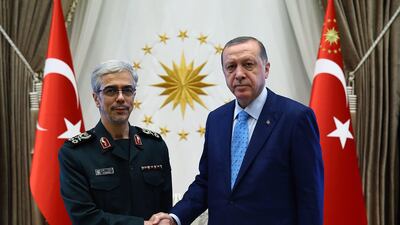We have just had a timely reminder of the dangers of allowing the sovereignty of any nation be undermined. It came when the Foreign Minister, Sheikh Abdullah bin Zayed, warned of the colonial designs on the region by Iran and Turkey, the actions of which are hindering efforts to find a political solution – and a fair one at that – to the conflict in Syria.
Turkey and Iran’s actions in Syria are a stark reminder of the Middle East’s uncomfortable history – in both modern and ancient times – when successive powers used the region for the extension of their own interests. Such dark periods should not be revived: they were a blot on our history, they have no place in our future. The end of Ottoman rule was a watershed for the development of modern national identities. Indeed, modern Turkey itself was one of the nations that emerged from this paradigm. Thus it is with no small irony that Turkey should attempt to overturn the last hundred years of a search for a modus vivendi among citizens of a nation and among the emerging nations and ancient ones of the Middle East. It is also ironic that as one of these nations, Qatar would be complicit in allowing Turkey to rebuild its military presence in the Arab world through its base there.
_____________________
Read more from Opinion on Syria
Editorial: It is a losing game in Syria
The question of reconstruction could determine Assad’s political destiny
It's time for the Syrian opposition to realise that its regional backers have moved on
_____________________
Along the southern shores of the Arabian Gulf, the nations of the GCC have invested time and effort in the interest of fraternity. While Qatar currently and mightily strains that brotherly equality, we must hope that it will soon appreciate the interest in liberty – or call it sovereignty – of fellow GCC states. We do not believe in the interference of others in our individual domestic affairs. But when we look north and to the farther west, to Iran and Turkey, we cannot help but question their motivations. In none of their actions can we see an attempt to exert a stabilising influence, allowing peace to settle so that a just sovereignty might establish itself in Syria.
Indeed, instability there imperils the sovereignty of nations of the region, for Syria is the centre of gravity of malign forces that seek to upend the domestic arrangements that we have spent the last century building and testing. And for the most part, these are good arrangements; where they are not, or not yet, the testing and rebuilding should continue through local, domestic efforts.
_____________________
Read more from Opinion
The price civilians had to pay for Assad's 'victory'
Is there ever an appropriate occasion to negotiate with terror groups?
_____________________
True friends of Syria want to help the people of that country achieve the peace they need to exert their sovereignty. Such a settlement, of course, must include a viable opposition to Bashar Al Assad. But the actions that Turkey and Iran take in Syria in the furtherance of their own interests do not comport with those of a friend of the Syrian people. Such a "colonial outlook", as Sheikh Abdullah described it, imperils the sovereignty of others in the region. This is not how friends treat each other.
Follow The National's Opinion section on Twitter

